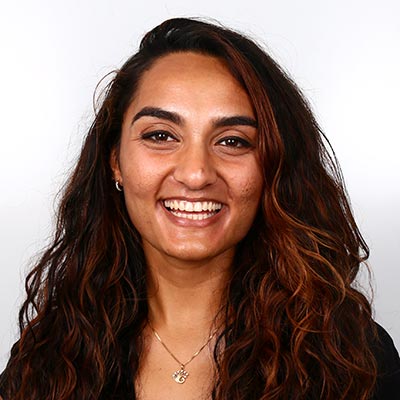End-of-life planning is difficult work, but this Northeastern alum has an app to make it easier
Author: Zorain Nizamani
Date: 11.22.23

In our busy lives, the mantra “out of sight, out of mind” is all too familiar. But Shivanjali Singh had an idea: What if she could launch a business that would allow people to dictate their end-of-life plans on their own terms?
“I have been an entrepreneur ever since I was a kid. I was always making up ideas, making jewelry and selling it, buying candy and selling it,” she said. “I was always able to give people something that they didn’t realize they wanted.”
Now, six years after completing her computer science and business studies at Khoury College and the D’Amore McKim School of Business, Singh is pursuing her newest venture: Legacy. The in-development app will allow users to effectively sort and execute their end-of-life planning — all under one umbrella, and in just four simple steps. It will do this by allowing users to efficaciously sort their assets and liabilities, as well as appoint trustees or guardians.
“The app begins with an onboarding quiz which tries to understand the psychology of the user and how far they are in their own end-of-life journey; the app then formulates a custom plan. The next step involves a task engine which breaks down that plan,” Singh explained. “The third part is a vault for documentation. The vault houses both documents that are auto generated through data collection from the task engine and those manually uploaded by the user. The last part is a marketplace which connects users to lawyers, counselors, and insurance agents — people who are in or adjacent to the field.”
Singh believes that her approach toward end-of-life planning could attract users because Legacy is being introduced during increasingly digitized times, and because of a mindset shift in the younger users the app will target.
“The novelty with Legacy is that its target market includes the most death-positive generations to date, and because of that, they have a different relationship with death,” Singh noted. “We are having you look back at life with reflection, not as a direction toward death, but toward the kind of experience you have had with your life.”
Those same generations are also especially conscious of data privacy in an age when the collection and storage of personal data continues to loom large, explains Singh.
“Being in tech, I know data has to be highly secure,” she said, adding that for Legacy’s future users, “All your data belongs to you; Legacy will not own your data. If you end up going through the marketplace, then you’re falling into the data constraints of working with a lawyer, which of course is also confidential.”
Singh also plans for the app to be subscription based, with users paying only a few dollars every month to take advantage. The app should be fully developed and available within the next few months.
But after providing all that information, what happens if a user no longer wants to use the app?
“We give you your data back as is and you no longer have anything remaining on the app,” Singh said. “Anything you upload is housed in your own secure part of the cloud and we don’t read it. We don’t scrub through your documents to see what you’ve done. We’re essentially opting in for you to tell us, ‘Hey, I uploaded my will,’ and that’s it.”
And when a user dies?
“You set up a granular permission to your vault, and the people you give this granular permission to are the only ones who have access to your documents,” Singh explained. “If you do pass away and Legacy has your data, there is always someone who has secondary ownership of your account.”
Singh believes Legacy is commercially viable, thanks in part to the computer science and business skills she honed at Northeastern.
“At this point in my career,” she said, “I believe I have gotten enough skills under my belt, and I feel the timing is just right for a tool like Legacy to be brought into the world for creating this ease and for democratizing end-of-life planning.”